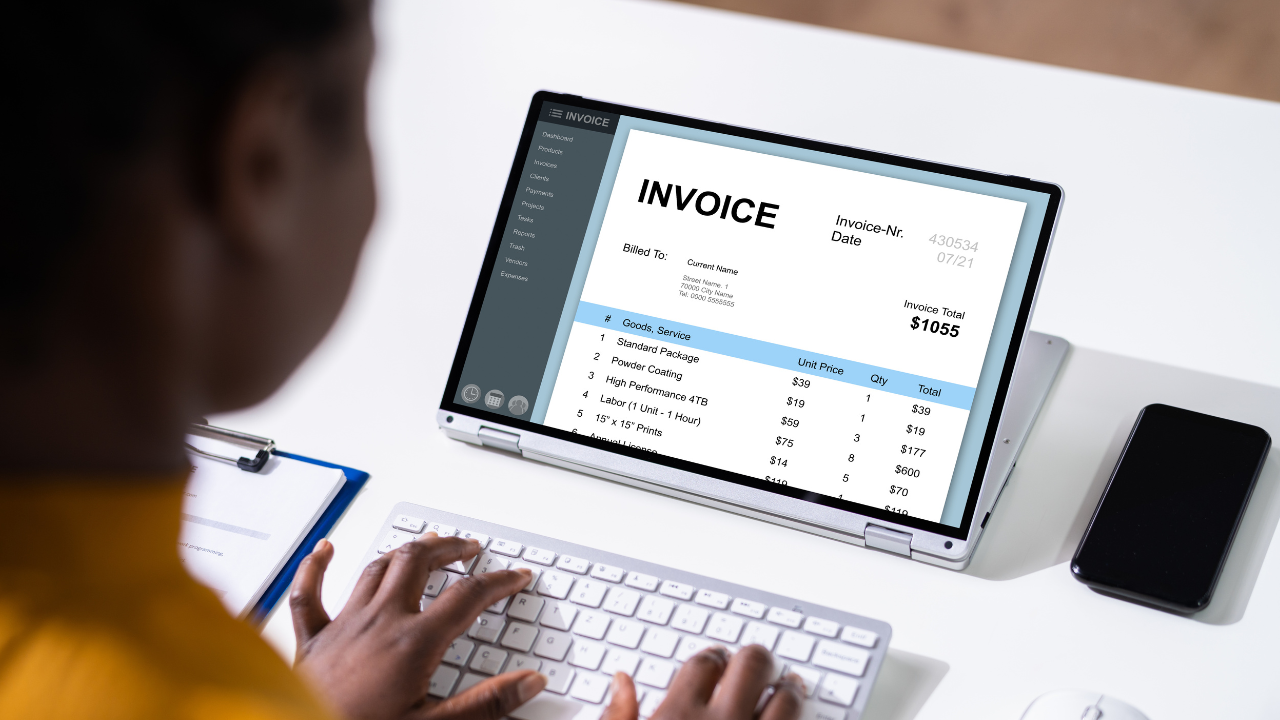Invoice factoring allows businesses to boost their cash flow. Businesses sell unpaid invoices to a third party or factoring business at a discounted rate, and these companies supply immediate payments to small businesses.
This is a way for businesses to avoid challenges like delayed payments and waiting for clients to pay invoices within agreed credit terms. They can use the money for payroll, inventory and other operational expenses.
What is Invoice Factoring?
Invoice factoring is different from invoice financing. Here are the differences between factoring and invoice financing.
- Invoice factoring occurs when a business sells invoices to a factoring outfit. That company must collect payments, paying about 70 to 90 percent in advance.
- Invoice financing involves a small business using invoices as collateral to get advances from a lending institution. In this situation, the small business needs to collect the money.
For invoice factoring, there’s an advance rate, and that’s the amount the company pays to the original business upfront. The discount rate or factoring fee is the money the factoring company charges.
When a small business needs to back up any invoices the factoring company can’t collect, it’s called recourse factoring. When a factoring company assumes almost all the risk for non-payment, it’s called non-recourse factoring. Invoice factoring and financing have obvious differences and applications.

How Does Invoice Factoring Work?
Here’s how invoice factoring works in steps.
- Choosing a factoring company should include looking at advanced rates and factoring fees. Look to see what industries the company specializes in and if the factoring is without or with recourse.
- When a small business applies to a factoring company, it must supply financial documents about its customers and invoices. Everyone involved must agree on the terms and then approve the application. After that, an agreement is signed.
- Businesses can submit the invoices they need to factor in electronically. Keep in mind factoring businesses look at the risk of non-payment. The invoice value is also considered.
- Once they verify all the information, a percentage of the invoices get delivered within 24 to 48 hours
- Once the factoring business takes over, it collects payment from the initial business customers. When the customer pays, the company subtracts the advance amount given to the business.
| Step | Description |
|---|---|
| Choosing a Factoring Company | – Consideration of advance rates and factoring fees. – Evaluation of the industries the company specializes in. – Decision on recourse vs. non-recourse factoring. |
| Application Process | – Submission of financial documents related to customers and invoices. – Agreement on terms between the small business and the factoring company. – Approval of the application followed by signing an agreement. |
| Invoice Submission | – Invoices can be submitted electronically. – Factoring companies assess the risk of non-payment and the value of the invoices. |
| Funding | – Upon verification, a percentage of the invoice value is delivered to the business, typically within 24 to 48 hours. |
| Collection and Settlement | – The factoring company takes over the collection process from the business’s customers. – When the customer pays, the factoring company subtracts the advance amount (plus fees) given to the business and remits the balance. |
The Role of a Factoring Company
Invoice factoring companies buy outstanding invoices and provide immediate financial support to the small businesses they get them from. The relationship is about more than financing; a cash flow solution is offered. Businesses get paid a significant percentage of their invoices upfront. One of the big advantages for any small business is an immediate, steady cash flow without waiting for traditional payment terms. A factoring business pays and then collects on the invoice.

Application and Approval Process
An invoice factoring company will use the following criteria before approving businesses for financing:
- The creditworthiness of the business’s clients is the most significant consideration. These companies look at payment history and financial stability.
- Factoring businesses specialize in specific industries, including wholesale, transportation and manufacturing.
- These companies look at the submitted invoices to ensure they’re free from possible legal disputes and likely to get paid without any hassles.
- Businesses must supply documentation with a list of their client’s financial statements, invoices, and tax ID numbers.
Receiving Advances and Fees Structure
This process is helpful for businesses that have long invoice payment terms but need cash.
- Businesses issue invoices to customers and sell them to a factoring business. That company verifies the invoice details and provides an advanced payment. The customer pays for the factoring business. Once the customer pays, they send the balance to the business and subtract their fee.
- Factoring companies usually advance up to 90% of an invoice upfront. The specific rate depends on the number of invoices and the industry. Quite often, factoring fees range from 0.5% to 5%.
Here’s an invoice factoring example.
A manufacturing company invoices a retailer for $10,000 with a 60-day payment term. The company then sells the invoice at an 80% advance rate.
The manufacturing company gets an advance of $8,000. The retailer pays the factoring business the entire $10,000 on the 60th day.
They charge 3% of $10,000, which equals $300. At the end of the transaction, the manufacturer gets $9,700 totaled. That includes the $8000 advance plus the remaining $2000, subtracted from the $300 fee. The factoring company pays that amount.

Benefits of Invoice Factoring for Small Businesses
Invoice factoring offers a range of benefits that can be particularly advantageous for small businesses seeking flexible and immediate financial solutions. These benefits include:
- Immediate Access to Capital:
- Factoring allows businesses to convert outstanding invoices into immediate cash, providing a more predictable cash flow. This is especially beneficial for covering short-term expenses or capitalizing on timely opportunities.
- Non-Debt Financing:
- One of the key advantages of invoice factoring is that it doesn’t add to a company’s debt obligations. This aspect helps in keeping the balance sheet healthier.
- Unlike traditional loans that require repayment (with interest), factoring simply involves selling your invoices at a discount, thus not incurring debt.
- No Collateral Required:
- Traditional financing often requires collateral, but invoice factoring does not. This can be a significant advantage for businesses that may not have the necessary assets to secure a loan.
- Time and Resource Savings:
- Outsourcing the management of accounts receivable to a factoring company can free up significant time and resources for business owners. This time can be better spent focusing on core business activities, such as sales, product development, and customer service.
- Credit Analysis and Risk Management:
- Factoring companies typically conduct credit checks on your clients before agreeing to purchase your invoices. This can provide valuable insights into the creditworthiness of potential and existing customers.
- By highlighting the reputation and payment history of your customers, factoring companies help you manage and mitigate credit risk more effectively.
- Flexible Financing Option:
- Invoice factoring provides a flexible financing option that can scale with your business’s sales volume. As your business grows and you invoice more, you can factor in more invoices to access more capital, in contrast to a fixed loan amount.
- Improved Financial Management:
- With faster access to cash, businesses can improve their financial management, meeting obligations on time and taking advantage of early payment discounts from suppliers.
- Enhanced Business Focus:
- By alleviating the burden of chasing down payments, businesses can refocus their efforts on strategic growth initiatives rather than being bogged down by financial constraints and administrative tasks related to accounts receivable management.
These advantages make invoice factoring an attractive option for small businesses in need of a cash flow solution. However, it’s essential to carefully consider the specific terms and conditions offered by factoring companies, as well as the potential impact on customer relationships, to ensure it aligns with your business objectives and values.

Invoice Factoring Cost
There are several fees and costs to consider when deciding to use this financial option, including the following:
- Factor Rates: This is the percentage of the invoice the factoring company advances to the business upfront. These rates generally range from 70 to 95%.
- Service Fees: The company charges this cost for its services. It usually ranges from 0.5% to 5%. Some companies use a tiered fee structure. You need to be careful and watch out for that because these fees can increase the longer any invoice is not paid.
- Additional Fees: Ensure you understand any service charges and set-up fees the company charges. Remember that if a factoring business needs to check your customer’s credit, that cost can be passed on to you.
What to Look for in Invoice Factoring Companies
A partnership with a factoring business needs to check some of the following boxes.
- The company needs to have experience and a transparent fee structure.
- Outstanding customer service and flexible factoring terms are essential.
- Reviews and testimonials about the company’s reputation can help you decide.
- Additional services like account management tools and reporting features should be looked at.
Take a good look at the platforms and technology the company uses. It should be user-friendly for submitting invoices and tracking payments.
Risks and Considerations of Factoring Invoices
Invoice factoring, while beneficial for enhancing cash flow, especially for small businesses in need of immediate financial liquidity, comes with its own set of risks and considerations. It’s important to weigh these factors carefully to make an informed decision:
- Dependency Risks: Relying heavily on invoice factoring companies can be precarious for small businesses. These companies might:
- Alter their fee structures unexpectedly, leading to higher costs.
- Change the terms of the agreement, potentially putting your business in a challenging position.
- Cost Considerations:
- Factoring fees can be significantly higher compared to traditional financing options such as bank loans or lines of credit. This can impact long-term financial sustainability.
- The cumulative cost over time, considering these fees, might outweigh the immediate benefits of improved cash flow.
- Loss of Control:
- Entrusting your accounts receivable to a factoring company means relinquishing some degree of control over them. This can influence:
- The manner in which invoices are managed and collected.
- The relationship with your clients, as the factoring company’s approach to collecting payments may differ from yours, potentially affecting client satisfaction and trust.
- Entrusting your accounts receivable to a factoring company means relinquishing some degree of control over them. This can influence:
- Impact on Business Relationships:
- The interaction between your clients and the factoring company can affect your business’s reputation. If the factoring company employs aggressive collection tactics, it could strain your relationships with clients.
- Confidentiality Concerns:
- Sharing sensitive financial information with a third party involves a level of risk. Ensuring that the factoring company respects confidentiality and has robust data protection measures is crucial.
- Contractual Obligations:
- Some factoring agreements might include long-term commitments or clauses that are not favorable to your business, such as minimum volume requirements or penalties for early termination of the contract.
- Possible Impact on Future Financing:
- Relying on invoice factoring can influence your business’s ability to secure other types of small business financing options. Lenders may view the use of factoring as a sign of financial instability.
Carefully evaluating these risks and considerations is essential before proceeding with invoice factoring. It may also be beneficial to explore alternative financing options and compare them against the potential costs and implications of factoring to ensure it aligns with your business’s long-term goals and financial health.
FAQs: Invoice Factoring
Here are some answers to questions small business owners ask.
What types of businesses can benefit from invoice factoring?
Wholesale, manufacturing and transportation businesses can benefit. Plus, any others that have long payment cycles.
How does invoice factoring affect relationships with clients?
Involving a third party can put a temporary kink in payment practices and direct communication with a business and its clients.
What happens to unpaid invoices in a factoring agreement?
In a non-recourse agreement, the factoring business takes on the risk of unpaid invoices. Other arrangements must be made in the recourse counterpart, or a company must buy back the owed amounts.
How can invoice factoring improve a small business’s cash flow?
A small business can get immediate access to a big part of the money that gets tied up in unpaid invoices.
How does a factoring company make money?
They charge clients a fee, usually a percentage of the invoice value.
Read More:
- What is an invoice?
- How to create an invoice
Image: Envato Elements
This article, “What is Invoice Factoring and How Does it Work?” was first published on Small Business Trends